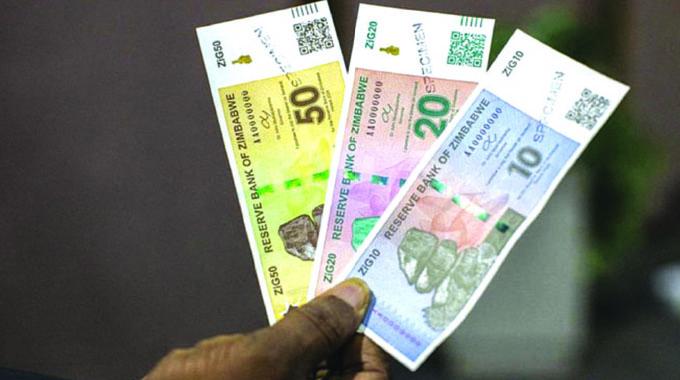News / National
ZiG ranked second worst performing currency
11 Jun 2025 at 10:26hrs |
0 Views

In a stark contrast of fortunes, Ghana's Cedi has emerged as the world's strongest-performing currency in 2025, gaining nearly 50% against the United States dollar, while Zimbabwe's Zimbabwe Gold (ZiG) ranks as the second worst, having depreciated by 33% year-on-year.
According to global currency performance rankings, only the Venezuelan BolÃvar has fared worse than Zimbabwe's ZiG in the past year. The ZiG, introduced in April 2024 to replace the beleaguered Zimbabwe dollar, currently trades at around ZiG35 to US$1 on the parallel market, despite an official rate of ZiG26.9. The widening gap reflects growing market scepticism and sustained pressures on the local currency.
On the other hand, Ghana's Cedi has surged to C10.15 per US dollar, up from levels above C15 in late 2024. This dramatic recovery is credited to a combination of disciplined monetary policy, surging gold export revenues, and international financial support.
Ghana's gold exports rose to US$11.6 billion in 2024, up from US$7.6 billion in 2023, injecting vital foreign exchange into the economy. The Bank of Ghana's bold move in March 2025 to raise its benchmark interest rate to 28% helped contain inflation and attracted increased foreign capital inflows.
Additionally, Ghana's US$3 billion International Monetary Fund (IMF) support package has significantly restored macroeconomic stability and boosted investor confidence. The West African nation has also accumulated record foreign currency reserves, now standing at US$11.4 billion, giving the Cedi a strong buffer against market volatility.
The Cedi's turnaround is especially noteworthy considering its dismal performance in 2022, when it lost over 55% of its value and was widely regarded as one of the world's weakest currencies. In just three years, Ghana has reversed its economic trajectory through focused reforms and effective fiscal management.
In Zimbabwe, however, the ZiG's apparent stability remains fragile. Analysts argue that the current exchange rate is being artificially propped up by tight monetary policies that have triggered a widespread liquidity crunch in the economy. While authorities continue to tout the ZiG as a gold-backed currency aimed at stabilising inflation and restoring confidence, market participants remain wary amid persistent economic challenges, including low productivity, limited forex availability, and constrained consumer spending.
The ZiG's poor performance underscores Zimbabwe's ongoing struggle to build credibility in its monetary system following years of hyperinflation, currency volatility, and shifting policy directions. Without sustained reforms, greater transparency, and renewed confidence in local financial institutions, analysts warn that the ZiG could face further pressure in the coming months.
As Ghana enjoys a currency renaissance, Zimbabwe continues to grapple with the consequences of a fragile and mistrusted monetary framework—highlighting the divergent paths African economies can take in managing their currencies.
According to global currency performance rankings, only the Venezuelan BolÃvar has fared worse than Zimbabwe's ZiG in the past year. The ZiG, introduced in April 2024 to replace the beleaguered Zimbabwe dollar, currently trades at around ZiG35 to US$1 on the parallel market, despite an official rate of ZiG26.9. The widening gap reflects growing market scepticism and sustained pressures on the local currency.
On the other hand, Ghana's Cedi has surged to C10.15 per US dollar, up from levels above C15 in late 2024. This dramatic recovery is credited to a combination of disciplined monetary policy, surging gold export revenues, and international financial support.
Ghana's gold exports rose to US$11.6 billion in 2024, up from US$7.6 billion in 2023, injecting vital foreign exchange into the economy. The Bank of Ghana's bold move in March 2025 to raise its benchmark interest rate to 28% helped contain inflation and attracted increased foreign capital inflows.
The Cedi's turnaround is especially noteworthy considering its dismal performance in 2022, when it lost over 55% of its value and was widely regarded as one of the world's weakest currencies. In just three years, Ghana has reversed its economic trajectory through focused reforms and effective fiscal management.
In Zimbabwe, however, the ZiG's apparent stability remains fragile. Analysts argue that the current exchange rate is being artificially propped up by tight monetary policies that have triggered a widespread liquidity crunch in the economy. While authorities continue to tout the ZiG as a gold-backed currency aimed at stabilising inflation and restoring confidence, market participants remain wary amid persistent economic challenges, including low productivity, limited forex availability, and constrained consumer spending.
The ZiG's poor performance underscores Zimbabwe's ongoing struggle to build credibility in its monetary system following years of hyperinflation, currency volatility, and shifting policy directions. Without sustained reforms, greater transparency, and renewed confidence in local financial institutions, analysts warn that the ZiG could face further pressure in the coming months.
As Ghana enjoys a currency renaissance, Zimbabwe continues to grapple with the consequences of a fragile and mistrusted monetary framework—highlighting the divergent paths African economies can take in managing their currencies.
Source - businessdaily.co.zw
Join the discussion
Loading comments…































